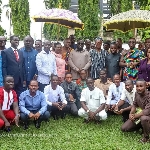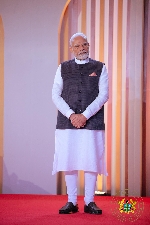GITW 2025: Experts call for smarter approach to infrastructure development
 A chief cutting the tape to declare GITW 2025 open
A chief cutting the tape to declare GITW 2025 open
The Founder and Senior Partner of AB & David Africa, Dr. David Ofosu Dorte, has expressed concerns over the common practice in Ghana's Public-Private Partnership (PPP) agreements, where the public sector takes the lead in conducting feasibility studies for projects.
According to him, it doesn't "make sense" for the public sector to conduct feasibility studies for PPP projects, as it has contributed significantly to Ghana's high public sector debt.
"We have borrowed huge amounts of money to do feasibility studies that we have not delivered," Dr. Dorte stated while speaking as the keynote speaker at the 2025 Ghana Investment and Trade Week Summit (GITW) held at the Accra International Conference Centre on July 2, 2025.
The GITW 2025 summit, themed "Constructing Prosperity: Advancing Industrial Growth Through Smart Infrastructural Planning," brought together local and international investors to explore potential areas for investment in Ghana.
Dr. Dorte explained that instead of conducting feasibility studies, the government should focus on carrying out pre-feasibility studies and concept notes for PPP projects. This approach, he noted, would help minimise risks and save money.
He emphasised that PPPs come with risks that, if not managed well, could harm the public sector.
"Many PPP projects have failed in Ghana because the risks associated with them were borne by our governments," he said, adding that these risks can be aggravated or external, requiring careful management.
Against this backdrop, Dr. Dorte recommended the creation of an ecosystem that encourages a stronger collaboration between the public and private sectors, adding that there should also be the political will to see the end of PPP projects.
He cautioned that, oftentimes, utterances by public officials who also hold party positions tend to drive away investors.
“We should be careful about statements we make when we hold both public and party positions,” he cautioned.
Furthermore, he called for the need for “our governments to structure PPP projects without bloating the public sector debt, which often leads to chaos.”
The President of the National House of Chiefs (NHC), Ogyeahoho Yaw Gyebi III, who was the Chairman for the occasion, underscored the importance of smart infrastructure planning in driving industrial growth and prosperity in Ghana.
He said chiefs were vital enablers of inclusive development, and their presence signified a shared commitment to the country's future.
According to him, PPPs have provided approximately $10 billion in infrastructure investments in the West African region, but Ghana has received relatively small amounts.
He, therefore, urged the adoption of blended finance models to attract Foreign Direct Investment (FDI) and stimulate growth.
The President of NHC also highlighted the need to empower Small and Medium-sized Enterprises (SMEs), which should not be seen as peripheral to the economy.
He noted that Ghana achieved 3.2% growth in 2024, led by the private sector, and affirmed that investing in infrastructure is key to driving factory development and overall growth.
Ogyeahoho Gyebi III encouraged the private sector to approach this era with confidence and innovation, promising support to the construction and building industry.
In a welcoming address, the Chairman of the Ghana Chamber of Construction Industry (GhCCI), Emmanuel Tetteh Martey, said the theme is not only relevant but also aligns with the government's 24-Hour Economy initiative and the Big Push, among others.
He called for a collective purpose to drive a modern, resilient, and prosperous Ghana.
"Infrastructure is the heartbeat of a nation's development, laying the foundation for trade and job creation," he stated.
The GhCCI Chairman commended the Mahama administration for its development agendas, including the Big Push and the 24-Hour Economy.
"The Big Push is not merely a slogan, but a significant employment and transformation initiative," he noted.
However, Mr. Martey stressed that a 24-hour economy requires a reliable power source and good infrastructure.
In this regard, he reaffirmed the GhCCI's commitment to supporting the government in developing a prosperous Ghana that benefits all Ghanaians.
Source: Classfmonline.com/Cecil Mensah
Trending News

Ashanti Regional Lands Commission board inaugurated to enhance land governance
11:38
Dr Harrison Kofi Belley elected GJA Volta Regional Chairman in closely contested polls
23:43
Majority Leader accuses Minority of hypocrisy over anti-LGBTQ+ Bill
09:16
BE/R: Kadue youth call for swift resolution to chieftaincy dispute amid rising tensions
08:02
Ashanti Region hosts second “Momentum Walk” with strong message against drug abuse
09:04
BoG reverses decision to terminate nearly 100 staff recruited in December 2024
07:16
Indian Prime Minister calls for stronger India-Ghana partnership to drive African growth
11:31
Experts urge government to prioritise teacher training in digital education
18:41
YEA partners Ghana AIDS Commission to launch youth-focused HIV prevention campaign
11:14
Health Minister allays fears over COVID-19 outbreak at University of Ghana
15:15




